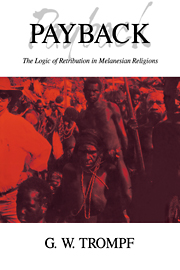Book contents
- Front Matter
- Contents
- Illustrations and tables
- Preface
- Abbreviations
- Preliminaries: The Theory of Retributive Logic
- Part One 'TRADITION'
- Part Two 'CARGO CULTISM'
- Chapter 4 Reprisal
- Chapter 5 Redemption
- Chapter 6 Wishing and Explaining the Extraordinary
- Part Three 'MODERNIZATION'
- Conclusions and Recommendations
- Bibliography
- Index of Melanesian Cultures
- General Index
Chapter 5 - Redemption
Published online by Cambridge University Press: 22 September 2009
- Front Matter
- Contents
- Illustrations and tables
- Preface
- Abbreviations
- Preliminaries: The Theory of Retributive Logic
- Part One 'TRADITION'
- Part Two 'CARGO CULTISM'
- Chapter 4 Reprisal
- Chapter 5 Redemption
- Chapter 6 Wishing and Explaining the Extraordinary
- Part Three 'MODERNIZATION'
- Conclusions and Recommendations
- Bibliography
- Index of Melanesian Cultures
- General Index
Summary
Cargo cults are attempts to involve the spirit order in the future of human reciprocities. The intervention of the ancestors, deities, God, and sometimes the whites (as representatives of new sources of spiritual power) is almost always taken to be necessary because the traditional patterns of reciprocation have either broken down, owing to the newer, unstable conditions borne by colonization, or simply proved unsatisfactory for ongoing needs. Repair and despair necessitate some supra-human redemption. Redemption, it turns out, serves as a very useful interpretative category, when treated typologically, to cover the satisfying of a simple longing for an untarnished, more certain, prosperous and less physically burdensome life-order (Burridge 1969b: 6–16). Cultists have a problem with present conditions because the cultural past—however capable of evoking nostalgias—has been thrown into doubt. It did not take long for ‘traditional ways’ to present themselves as technologically far inferior to expatriate accomplishments; as politically powerless before colonial control; as spiritually faulty and vulgar beside a religion with book and chalices, which favoured scrubbed bodies and clean clothes to charcoal-faced, white-eyed ferocity.
As a result, there is a strong element of dependence in cargo movements. Their members depend on a dramatic occurrence—some breakthrough, some rectification of a cosmic imbalance—and this is not precluding the possibility that the cultists could become dependent on the very body of people they first identified as the source of their difficulties: the whites We have already mused over the Melanesian ambivalence toward the bearers of the colonial order.
- Type
- Chapter
- Information
- PaybackThe Logic of Retribution in Melanesian Religions, pp. 238 - 258Publisher: Cambridge University PressPrint publication year: 1994

